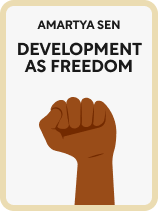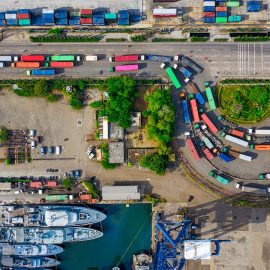

This article is an excerpt from the Shortform book guide to "Development as Freedom" by Amartya Sen. Shortform has the world's best summaries and analyses of books you should be reading.
Like this article? Sign up for a free trial here .
What’s the relationship between democracy and economic growth? Does democracy have a direct effect on the growth of a nation’s economy?
Policymakers around the world are conflicted on the role democracy plays in economic growth. Amartya Sen, author of Development as Freedom, says that the key to helping poor economies thrive is to implement a democracy into their government.
Let’s look at Sen’s argument that supports establishing democracies in underdeveloped nations—and why some people disagree with him.
Does Democracy Help Development More Than Authoritarianism?
The role that democracy plays in development has divided policymakers around the globe. First, we’ll examine the arguments against establishing democracy in comparatively underdeveloped nations. Then, we’ll explain Sen’s argument for why democracy and economic growth have a beneficial relationship.
Sen identifies two common arguments against democracy in poor nations, which he believes are misconceptions:
- Democracy gets in the way of economic development.
- People in poor nations don’t desire a democratic form of government.
The Lee Thesis
Some opponents of democracy in developing countries echo the “Lee thesis,” named for former Prime Minister of Singapore, Lee Kuan Yew, which states that authoritarian regimes are better at enriching economic growth than democracies.
Proponents of the Lee thesis attribute this to an authoritarian focus on economic development rather than on freedom, which is seen as unnecessary to eradicating poverty. For example, Singapore, South Korea, and China achieved higher growth while under authoritarian governments than did democracies like India, Costa Rica, and Jamaica.
However, Sen states that the Lee thesis is based on faulty evidence. Empirical studies reveal little relationship between authoritarianism and economic growth. By contrast, democratically-oriented policies have helped increase economic growth.
Examination of the “East Asian Miracle” economies (such as Japan, Singapore, Taiwan, and South Korea), which achieved rapid economic growth in the 20th century, suggests the following policies are most helpful:
- Openness to competition
- Use of global markets
- High literacy rates
- Land reforms
- Incentives for industrialization, research and development, and exports
Sen argues all of these helpful policies are compatible with democratic rights. Additionally, many authoritarian regimes that have failed to adopt these policies have remained poor. Therefore, the assertion that authoritarianism is either necessary or sufficient to achieve economic growth is false.
Do the Poor Value Democracy?
Another argument made against democracy is that most people in underdeveloped nations don’t want it: They’re too concerned with putting food on the table to worry about voting rights or other tenets of democracy.
However, Sen contends that it’s hard to tell what average people in authoritarian regimes desire since they lack the means of expressing their honest opinions without the freedom of speech and a free press. When people in poor countries do have the means to give their opinions honestly, Sen contends they opt for democracy. In India in the 1970s, this is exactly what happened. Voters rejected Prime Minister Indira Gandhi’s emergency declaration, which would have suspended basic political and civil rights in response to widespread anti-government protests. Sen concludes that although they’re among the poorest on Earth, the people of India demonstrated that they value democratic rights.
Amartya Sen’s Take on Democracy and Economic Growth
As Sen has explained, democracy has both intrinsic value and instrumental value. As social creatures, humans place value on the ability to express their views and participate in the social and political activities of the community.
We also value democracy as a means to economic and social development as well as an instrument to improve national welfare. For example, democratic leaders must respond accordingly to public opinion or risk electoral defeat, while authoritarians are insulated from the pressures of public opinion. In other words, democracy aligns the interests of government decision-makers with the majority of the population.
This dynamic, according to Sen, explains a historical fact: No democracy has suffered a famine. Famines have happened in tribal communities, monarchies, technocratic regimes, imperial colonies, and under many other forms of government—but not in any place with free and fair elections and a free press.
(Shortform note: Frances D’Souza, writing in the Journal of Peace Research, argues that preventing famines has more to do with freedom of the press than democratic elections. Since there are nations that hold democratic elections but control the media, they may still be susceptible to famine. On the other hand, there are countries where regime change is rare, but where a free press still plays the role of watchdog.)

———End of Preview———
Like what you just read? Read the rest of the world's best book summary and analysis of Amartya Sen's "Development as Freedom" at Shortform .
Here's what you'll find in our full Development as Freedom summary :
- The five types of freedom that are integral to economic development
- How democracy can prevent famine
- How empowering women helps communities






